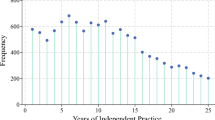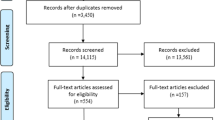Abstract
Background
The objective of the current study was to analyze various patient-related factors related to patient-reported quality of overall and surgical care following surgical resection of lung or colorectal cancer.
Methods
Between 2003 and 2005, 3,954 patients who underwent cancer-directed surgery for newly diagnosed lung (30.3 %) or colorectal (69.7 %) cancer were identified from a population- and health system-based survey of participants from multiple US regions. Factors associated with patient-perceived quality of overall and surgical care were analyzed with multivariable logistic regression models.
Results
Overall, 56.7 % of patients reported excellent quality of overall care and 67.9 % of patients reported excellent quality of surgical care; there was no difference by cancer type (P > 0.05). Factors associated with lower likelihood to report excellent quality of overall and surgical care included female sex, minority race, and the presence of multiple comorbidities (all odds ratio [OR] <1, all P < 0.05). Patients who had higher levels of education (overall quality: OR 1.62; surgical quality: OR 1.26), higher annual income (overall quality: OR 1.29; surgical quality: OR 1.23), and good physical function (overall quality: OR 1.35; surgical quality: OR 1.24) were all more likely to report excellent quality of overall and surgical care (all P < 0.05). Furthermore, patients who reported their physician as having excellent communication skills (overall quality: OR 6.49; surgical quality: OR 3.74) as well as patients who perceived their cancer as likely curable (overall quality: OR 1.17; surgical quality: OR 1.11) were more likely to report excellent quality of overall and surgical care (all P < 0.05).
Conclusion
Patient-reported quality of care is associated with several factors including race, income, and educational status, as well as physician communication and patient perception of likelihood of cure. Future studies are needed to more closely examine patient–physician relationships and communication barriers, particularly among minority patients and those with lower income and educational status.




Similar content being viewed by others
References
Siegel RL, Miller KD, Jemal A. Cancer statistics, 2015. CA: a cancer journal for clinicians. 2015;65(1):5–29
Henley SJ, Singh SD, King J, Wilson R, O'Neil ME, Ryerson AB, et al. Invasive cancer incidence and survival—United States, 2011. MMWR Morbidity and mortality weekly report. 2015;64(9):237–42.
Siegel R, Desantis C, Jemal A. Colorectal cancer statistics, 2014. CA: a cancer journal for clinicians. 2014;64(2):104–17.
Weeks JC, Catalano PJ, Cronin A, Finkelman MD, Mack JW, Keating NL, et al. Patients' expectations about effects of chemotherapy for advanced cancer. The New England journal of medicine. 2012;367(17):1616–25.
Hack TF, Degner LF, Parker PA, Team SC. The communication goals and needs of cancer patients: a review. Psycho-oncology. 2005;14(10):831–45; discussion 46–7.
Kehl KL, Landrum MB, Arora NK, Ganz PA, Ryn MV, Mack JW, et al. Association of actual and preferred decision roles with patient-reported quality of care: Shared decision making in cancer care. JAMA Oncology. 2015.
Kenzik KM, Ganz PA, Martin MY, Petersen L, Hays RD, Arora N, et al. How much do cancer-related symptoms contribute to health-related quality of life in lung and colorectal cancer patients? A report from the Cancer Care Outcomes Research and Surveillance (CanCORS) Consortium. Cancer. 2015.
Malin JL, Ko C, Ayanian JZ, Harrington D, Nerenz DR, Kahn KL, et al. Understanding cancer patients' experience and outcomes: development and pilot study of the Cancer Care Outcomes Research and Surveillance patient survey. Supportive care in cancer : official journal of the Multinational Association of Supportive Care in Cancer. 2006;14(8):837–48.
Tanco K, Rhondali W, Perez-Cruz P, Tanzi S, Chisholm GB, Baile W, et al. Patient Perception of Physician Compassion After a More Optimistic vs a Less Optimistic Message: A Randomized Clinical Trial. JAMA Oncol. 2015;1(2):176–83.
Ayanian JZ, Chrischilles EA, Fletcher RH, Fouad MN, Harrington DP, Kahn KL, et al. Understanding cancer treatment and outcomes: the Cancer Care Outcomes Research and Surveillance Consortium. Journal of clinical oncology : official journal of the American Society of Clinical Oncology. 2004;22(15):2992–6.
Catalano PJ, Ayanian JZ, Weeks JC, Kahn KL, Landrum MB, Zaslavsky AM, et al. Representativeness of participants in the cancer care outcomes research and surveillance consortium relative to the surveillance, epidemiology, and end results program. Medical care. 2013;51(2):e9-15.
Ayanian JZ, Zaslavsky AM, Arora NK, Kahn KL, Malin JL, Ganz PA, et al. Patients' experiences with care for lung cancer and colorectal cancer: findings from the Cancer Care Outcomes Research and Surveillance Consortium. Journal of clinical oncology : official journal of the American Society of Clinical Oncology. 2010;28(27):4154–61.
Shaw JW, Johnson JA, Coons SJ. US valuation of the EQ-5D health states: development and testing of the D1 valuation model. Medical care. 2005;43(3):203–20.
Kim Y, Winner M, Page A, Tisnado DM, Martinez KA, Buettner S, et al. Patient perceptions regarding the likelihood of cure after surgical resection of lung and colorectal cancer. Cancer. 2015.
Keating NL, Beth Landrum M, Arora NK, Malin JL, Ganz PA, van Ryn M, et al. Cancer patients' roles in treatment decisions: do characteristics of the decision influence roles? Journal of clinical oncology : official journal of the American Society of Clinical Oncology. 2010;28(28):4364–70.
Chen AB, Cronin A, Weeks JC, Chrischilles EA, Malin J, Hayman JA, et al. Expectations about the effectiveness of radiation therapy among patients with incurable lung cancer. Journal of clinical oncology : official journal of the American Society of Clinical Oncology. 2013;31(21):2730–5.
Sofaer S, Firminger K. Patient perceptions of the quality of health services. Annual review of public health. 2005;26:513–59.
Cooper-Patrick L, Gallo JJ, Gonzales JJ, Vu HT, Powe NR, Nelson C, et al. Race, gender, and partnership in the patient-physician relationship. JAMA : the journal of the American Medical Association. 1999;282(6):583–9.
van Ryn M, Burke J. The effect of patient race and socio-economic status on physicians' perceptions of patients. Social science & medicine. 2000;50(6):813–28.
Mazor KM, Gaglio B, Nekhlyudov L, Alexander GL, Stark A, Hornbrook MC, et al. Assessing patient-centered communication in cancer care: stakeholder perspectives. Journal of oncology practice / American Society of Clinical Oncology. 2013;9(5):e186-93.
Robinson JD, Hoover DR, Venetis MK, Kearney TJ, Street RL, Jr. Consultations between patients with breast cancer and surgeons: a pathway from patient-centered communication to reduced hopelessness. Journal of clinical oncology : official journal of the American Society of Clinical Oncology. 2013;31(3):351–8.
Weeks JC, Cook EF, O'Day SJ, Peterson LM, Wenger N, Reding D, et al. Relationship between cancer patients' predictions of prognosis and their treatment preferences. JAMA. 1998;279(21):1709–14.
Bennett M, Alison D. Discussing the diagnosis and prognosis with cancer patients. Postgraduate medical journal. 1996;72(843):25–9.
Mazor KM, Beard RL, Alexander GL, Arora NK, Firneno C, Gaglio B, et al. Patients' and family members' views on patient-centered communication during cancer care. Psycho-oncology. 2013;22(11):2487–95.
Maguire P. Improving communication with cancer patients. Eur J Cancer. 1999;35(14):2058–65.
Nelson JE, Gay EB, Berman AR, Powell CA, Salazar-Schicchi J, Wisnivesky JP. Patients rate physician communication about lung cancer. Cancer. 2011;117(22):5212–20.
El-Jawahri A, Traeger L, Park ER, Greer JA, Pirl WF, Lennes IT, et al. Associations among prognostic understanding, quality of life, and mood in patients with advanced cancer. Cancer. 2014;120(2):278–85.
Roberts CS, Cox CE, Reintgen DS, Baile WF, Gibertini M. Influence of physician communication on newly diagnosed breast patients' psychologic adjustment and decision-making. Cancer. 1994;74(1 Suppl):336–41.
Tulsky JA, Arnold RM, Alexander SC, Olsen MK, Jeffreys AS, Rodriguez KL, et al. Enhancing communication between oncologists and patients with a computer-based training program: a randomized trial. Annals of internal medicine. 2011;155(9):593–601.
Curtis JR, Back AL, Ford DW, Downey L, Shannon SE, Doorenbos AZ, et al. Effect of communication skills training for residents and nurse practitioners on quality of communication with patients with serious illness: a randomized trial. JAMA : the journal of the American Medical Association. 2013;310(21):2271–81.
Ayanian JZ, Zaslavsky AM, Guadagnoli E, Fuchs CS, Yost KJ, Creech CM, et al. Patients' perceptions of quality of care for colorectal cancer by race, ethnicity, and language. Journal of clinical oncology : official journal of the American Society of Clinical Oncology. 2005;23(27):6576–86.
Cooper LA, Roter DL, Johnson RL, Ford DE, Steinwachs DM, Powe NR. Patient-centered communication, ratings of care, and concordance of patient and physician race. Annals of internal medicine. 2003;139(11):907–15.
Saha S, Komaromy M, Koepsell TD, Bindman AB. Patient-physician racial concordance and the perceived quality and use of health care. Archives of internal medicine. 1999;159(9):997–1004.
Gurland BH, Merlino J, Sobol T, Ferreira P, Hull T, Zutshi M, et al. Surgical complications impact patient perception of hospital care. Journal of the American College of Surgeons. 2013;217(5):843–9.
Author information
Authors and Affiliations
Corresponding author
Ethics declarations
Funding
This work of the CanCORS consortium was supported by grants from the National Cancer Institute (NCI) to the Statistical Coordinating Center (U01 CA093344) and the NCI supported Primary Data Collection and Research Centers (Dana-Farber Cancer Institute/Cancer Research Network U01 CA093332, Harvard Medical School/Northern California Cancer Center U01 CA093324, RAND/UCLA U01 CA093348, University of Alabama at Birmingham U01 CA093329, University of Iowa U01 CA093339, University of North Carolina U01 CA093326) and by a Department of Veterans Affairs grant to the Durham VA Medical Center VA HSRD CRS-02-164).
Conflict of Interest
The authors declare that they have no competing interests.
Rights and permissions
About this article
Cite this article
Ejaz, A., Kim, Y., Winner, M. et al. Associations Between Patient Perceptions of Communication, Cure, and Other Patient-Related Factors Regarding Patient-Reported Quality of Care Following Surgical Resection of Lung and Colorectal Cancer. J Gastrointest Surg 20, 812–826 (2016). https://doi.org/10.1007/s11605-015-3035-5
Received:
Accepted:
Published:
Issue Date:
DOI: https://doi.org/10.1007/s11605-015-3035-5




